泛读教程 第三册 课件 答案 Unit 3
unit3 英语泛读教程第三册

Unit 3 Bursting the Magic BubbleⅠObjectives1. Understanding the text2. Mastery of some language points3. Learning something about magic4. Learning the scientific principles behind the magic performanceⅡKey points1.Full understanding of the text3.Explanation of some difficult words3. Learning the scientific principles behind the magic performancebehind the magic performance.2.Some wo rds might cause difficulty in students’ understanding of the textAbout two periods of class will be used for the analysis and discussion of the passage itself.Total class hours: three periodsAsk some students to perfume some simple magic tricks (they should prepare before the class) in front of the whole class. Let them guess where the tricks lie. 2. Warm-up questions(1)Do you like watching magic performance? Why?(2)Which magician do you like bet?(3)Which magic trick do you like to watch best?3. Related information(1) Magic may refer to:Magic (paranormal)anything that is not naturally explainable by any laws of nature. Magical thinkingFolk magic, traditional systems of magicMagick, the magical system of Aleister Crowley and ThelemaWitchcraft, the use of certain kinds of supernatural or magical powersMagic (illusion), the art of entertaining audiences by performing illusions and tricks Street magic, sleight of hand, etc.(2) Magic may be inIn fantasy fictionIn science and mathematics:In gamesIn popular cultureIn computing programming:Among radio stations(3) Famous magiciansWhat and who do you think of when asking about famous magicians?For most of us, the image is of a finely dressed man in a tuxedo or suit, possibly with a top hat, a magic wand and a handkerchief - the magician's uniform of choice.However, whilst some famous magicians do use this attire, not all magicians have conformed to this stereotype - indeed, sometimes their tricks required far less in the way of clothing, but still with their modesty intact, of course.Over the years, there have been so many famous magicians, actually too numerous for them all to get a mention, so we will concentrate on some of the more well known ones.All of these famous magicians have brought their own unique style to performing magic, illusions, tricks and escapology.Harry Houdini - probably one of the most famous magicians of them all, well known for escaping chains, ropes, handcuffs and straitjackets.David Copperfield - renowned for his spectacular illusions, including making the Status of Liberty disappear from view.Siegfried and Roy - famous magicians probably best known for their use of white tigers in their spectacular stage shows.Lance Burton - a popular American magician and also the first American to win the "World Championship of Magic".Doug Henning - a famous magician born in Canada. A colourful character with his brightly coloured clothes, thick moustache and long hair.David Blaine - initially known for his street magic, he now performs somewhat bizarre stunts such as being encased in a block of ice for over 60 days.Penn and Teller - a double act of famous magicians who are somewhat eccentric in their performances, enraging other magicians for publicly revealing how some tricks are done.Derren Brown - a prominent mind control performer who leads audiences along with subtle hints and psychological techniques, often to great effect.(4)David CopperfieldThe best known and richest magician-he ranks among the wealthiest of all entertainers-David Copperfield is a household name. He is known to millions through his numerous television specials over the last couple of decades and he continues to tour, taking his show around the country.Takes to Magic: Copperfield was born in New Jersey on September 16, 1956. He started as a ventriloquist and then quickly took to magic. Copperfield became theyoungest magician admitted to the Society of American Magicians (SAM). At age 16, he taught a magic course at New York University. When he was 18, Copperfield was cast as the lead in a Chicago production called “The Magic Man.”Network Magic Specials: His many magic specials have aired on network television over the past two decades, bringing his brand of illusion and magic to millions. Copperfield not only performs with large illusions, his shows typically feature a major magical feat.The Magic of David Copperfield ?a great way to describe one of the most spectacular illusionists of our time. His magic talent begin at an early age where he billed himself as 揇avino, the Boy Magician?and he was the youngest person ever to be admitted to the Society of American Magicians at age 14.The magic of David Copperfield was so good he was also teaching the subject at New York University when just 16 years of age. Originally David Kotkin, it wasn抰until he was 18 years old that he decided on the stage name David Copperfield.He got his break into television just a year later, but it was a few years after that when The Magic of David Copperfield series was commissioned.The Magic of David Copperfield 3 that saw the levitation of a Ferrari, an illusion that could have cost David his life as when only three feet in the air, the car fell.Making The Statue of Liberty disappear was performed in The Magic of David Copperfield 5. This amazing illusion involved a live audience sitting in front of two towers, and between them, in the distance was The Statue of Liberty. A curtain was raised using the two towers and when lowered, amazingly the Statue had disappeared.By now, The Magic of David Copperfield was getting huge audiences.Walking through The Great Wall of China was another superb illusion performed in The Magic of David Copperfield 8. A covered frame is placed next to the wall and a light shone from behind. David enters the frame and, as a silhouette, is seen to disappear into the wall. On the other side of the wall, a similar frame is constructed and a silhouette is seen to appear out of the wall before David removes the curtains to reveal himself.In The Magic of David Copperfield 13, he performs Mystery On The Orient Express where a carriage of the Orient Express is covered with a huge curtain, the carriage is then levitated before the curtain is removed to reveal the carriage has disappeared.David performed his most remarkable illusion to date in The Magic of David Copperfield 14. He mimics the take-off of a bird, and then starts to fly and swoop around the stage. Hoops are then rotated around his body to show there are no wires before he enters a glass case and levitates in the, now lidded, case.(5) Summary of magicThe art of magic and conjuring has been prevalent for hundreds if not thousands of years, baffling and astounding audiences with tricks that convince them the impossible has been achieved. This sort of magic, commonly called street magic, is highly respected due to the closeness the illusionist must keep with his audience. Although the veil of secrecy is usually impenetrable amongst magicians, it is possibleto work alongside a professional magician or illusionist and learn from his techniques.4. Text analysisTwo psychologists ’ researches and comments:Wiseman ---professor of psychology and an accomplished magicianKuhn ---psychologistMagicians’ tricks (secret action, deception) ---phenomenon----magicAudience ’s reaction (brain activities) ---why? ---scienceHistory of magic research and unsolved mysteryRecent development and discoveryFuture goal and direction of future research5. Key words and phrases(1) magic/magician (2) scramble (3) expertise (4) disruption (5renaissance) (6) assumption (7dexterity)(8)manipulate(9) sleight of hand(10) autism(11) get to grips with(12) illusion6. Questions for discussion(1) Du you agree that the appeal of magic is universal? Why?(2) What implications do you think the scientists’ research in magic tricks might have to our ways of perceiving the world around us?7. Exercises about text A8.. Fast Reading & Exercises2. Preview Unit 4。
泛读教程(三)课后题答案(Unit 1-15)

《泛读教程》第三册课后题答案Unit1Section AVocabulary Building:I.1.practical,practice,practices,practical,practiced2.worthless,worthy,worthwhile,worth,worth3.vary,variety,variation,various,Various4.absorbing,absorbed,absorb,absorption,absorbentII.1.effective,efficient,effective2.technology,technique3.middle,medium,mediumClozeGoing/about/trying,expectations/predictions,questions,answers,predictions/expectations,tell, know/foretell,end,develop/present,worthSection BTFTT,CBCC,TFF,CAA,CCAUnit2Section AVocabulary Building:I.mess,preference,aimlessly,remarkable,decisive,shipment,fiery,physically,action,housing II.1.aptitude,attitude2.account,counted,counted3.talent,intelligenceClozeOther,just/only,has,some/many,than,refuse,see/know/understand,that,without,If, ready/willing/educated/taught,wrong/incorrect/erroneousSection BACC,CC,CCC,ACB,ABASection CCCDDACUnit3Section AVocabulary Building:I.Noun Verb Adjective Adverbadmission admit admissible Admissiblyreliance rely reliable Reliablydefinition define definite Definitely assumption assume assumed/assuming Assumedly/assumingly behavior Behave behavioral Behaviorallyvariety Vary Various/varied Variously/variedly Part/partiality Part partial Partiallymanager manage managerial Managerially correlation correlate correlative Correlatively Adaptation adapt adaptive adaptivelyII.1.inspired,aspired,inspired2.token,badges,token3.contemporaries,temporary,contemporaryClozeCommunicate,ways/means/ones,using/saying,in,of,message,meet/have/encounter/experience, causes,meaning,to,eyesSection BBAB,BAC,FFT,TTF,CCBSection CBBDDBCCAFFTFFTUnit4Section AReading Skill:Skimming2-10BBAC BCCAAVocabulary Building:I.moist,betrayal,exclusively,inhumane,amazed/amazing,endangered,marvels,deadlyII.1.dessert,deserted2.favorite,favorable,favorable3.awarded,reward,awardedClozeParents,idea,at/by,seen,landmarks,instance/example,migrate,guide/direct,pole,effect/ influence,It/This,if/whether,experimentsSection BCCB FTF BCA CCB ACCSection CFFTFF FTTFFUnit5Section AVocabulary Building:I.Noun Verb Adjective Adverbassumption assume assumed/assuming assumedly/assumingly acknowledgement acknowledge acknowledged acknowledgedly reflection reflect reflective reflectively domination dominate dominant dominantlycategory categorize categorical categorically implication imply implicative implicatively reassurance reassure reassuring reassuringly definition define definite definitelyII.1.Historical,historic2.rejected,resist3.test/analyze,analyzedClozeExisted/appeared,ever,head/brain,body,found,language,use/value/significance/importance, single,passed,ahead,survival/existence,handling/overcomingSection BCAB CBB TTT FTT CACSection CBBAA ACBCUnit6Section AWord Pretest:CACBA BACAB ABVocabulary Building:I.availability avail available Availablyconquest conquer Conquering/Conqueringlyconqueredluxury luxuriate luxurious Luxuriouslyorigin originate original Originally occurrence occur Occurrentsystem systematize Systematical/Systematicallysystematicphonology phonological Phonologicallydecision decide Decided/decisive Decidedly/decisively variety vary various Variously superiority superior SuperiorlyII.1.peculiar,particular,particular2.assess,access,access3.resources,source,sourcesClozeSex,Men,differs,compliment/words,complimenting,causes,makes,languages,have,outside, understood,have,use,circle/world/fieldSection BCBBBA CBCCC CBACC BASection CBBCAB BACCBUnit7Section AWord PretestABABC BACVocabulary Building:I.deduced,behavior,adhere,replacement,option,delicacy,enormous,pursuitII.1.inquired,required,inquire,requiredpatible,comparable,compatible,comparableClozeSatellite,some,space,asked/wondered,life,sort/kind,orbiting/going/circling,have,living, were,believe,own,solar,where,likely,living,throughSection BFTFFT TTTTF FFBBC ACCSection CBCBCC AEDEBAFDCUnit8Section AVocabulary Building:1.occupataion,occupy,occupational,occupationallysegregation,segregate,segregateddiscrimination,discriminate,discriminating/discriminatory,discriminatingly/discriminatorily enforcement,enforce,enforceable,enforceablyexclusion,exclude,exclusive,exclusivelyperseverance,persevere,persevering,perseveringlyconviction,convict,convictive,convictivelyamendment,amend,amendablesuperficiality,superficialize,superficial,superficiallyspectator,spectate,spectatorial2.1.a.job b.career c.jobs d.career2.a..principal b.principles c.principal d.principle3.a.feminien b.female c.feminineClozeAcceptable,domestic,property,wages,husband,divorce,claims,legal,suit,permitted,make, excluded,lacked,belonged,determinedSection BBACCB CACCC AABBA C TTFSection CCCAACBUnit9Section AVocabulary Building:1.1.typifies2.dominant3.familialpetitive5.vibrate6.descended7.departure8.boom9.countless10.symbolizes2.1.a.recreative b.recreates c.recreation2.a.rhythm b.rhyme c.rhymes d.rhythmClozeSea,within,of,divides,built/constructed/completed,celebrated,inside/in,attract,together,whenSection BFTFTT CCBBC BAACC ACSection CBAACA BCCCCUnit10Section AVocabulary Building:1.consequence,,consequent/consequential,consequently/consequentially sophisticatiion,sophisticate,sophisticated,sophisticatedlyreference,refer,referable,referablyconversation,converse,conversational,conversationallyspace,space,spatial/spacious,spatially/spaciouslydetachment,detach,detachable/detached,detachably/detachedlyintervention,intervene,interveningtype,typify,typical,typically2.1.assure,ensure,assured,ensure2.arises,raised,rise,raised,arisen3.clue,cues,clue,cueClozeWell,separating/isolating,is,own,close,need,look,order,respect,follow,prior,sign/cue,help, was/were,elseSection BBBC TTF BCA CAC TFFSection CTFFTF FFFUnit11Section AVocabulary Building:1.information,inform,informative,informativelyspecification,specify,specific,specificallyaddition,add,additional/additive,additionally/additivelyspecialty,specialize,special,speciallynarration,narrate,narrative,narrativelyextension,extend,exxtensive,extensivelyorigin,originate,original,originallyexplosion,explode,explosive,explosivelyambiguity,,ambiguous,ambiguouslyestablishment,establish,established1.extension2.mabiguity3.orignal4.specified5.additional6.unambiguously7.explosionrmation9.specialized10.narrative11.establishment2.1.transform,transferred,transferred,transformed2.lonely,alone,lonely,aloneClozeLibrary,amounted,own,burned/destroyed,countries’,send,suggestion/proposal,librarySection BACBCB ACCAC ABABB ABSection CBCACC CBCCCUnit12Section AVocabulary Building:1.reaction,mass,polluting,planetary,suspicious,alarming,emitted,emerged2.1.warned,threatened2.spread,spread,sprayed3.emergency,emergenceClozeSolve,communities,creative,prevention,disposal,resources,recycloing,waste,increase,place, measures,amountSection BFFTT BCAC FTFF ABC CBCSection CBCAAC CBCUnit13Section AVocabulary Building:1.symptom,symptomize,symptomatic,symptomaticallylonging,long,longing,longinglyaddition,add,additional additive,additionally/additivelymanifestation,manifest,manifest,manifestlydepression,depress,depressed/depressing,depressedly/depressinglyinvariability,,invariable,invariablyseparation,separate,separate,separatelycondemnation,condemn,condemnable,condemnablyimagination,imagine,imaginary,imaginarilyaffection,affect,affecting,afeectingly2.1.remedies,recipe,remedy,recipe2.alternate,altered,alternate,alter3.acknowledged,knowledge,acknowledgedClozeStep,acknowledge,prevent,essential,physician,due,physical,psychosomatic,disease, confidence,symptoms,thorough,emotional,upsettingSection BCBCAB CBBCB ABCACSection CTFFFT FTFFFUnit14Section AVocabulary Building:1.reluctant,evolution,atrributed,catastrophic,assoicate,indifferent,emerged,stir2.1.evolved,revolved,evolved2.dismay,dismal,dismal,dismay3.contribute,attributed,contributed,attributedClozeCharacteristic/trait/nature,changed/had,to,long,get/eat,possessed/developed/had,stretched /lengthened,longer,passed,After,have,theory,effect/influence,notion/idea,changeSection BDAB FTFTF DAD BAC FTFSection CTFTFT FTFUnit15Section AVocabulary Building:1.Prevention,prevent,preventive,preventivelyFederation,federate,federal,federallyInadequacy,,inadequate,inadequatelyDeception,deceive,deceptive,deceptivelyProsperity,prosper,prosperous,prosperouslyLife,live,live/living/aliveEffect,effect,effective,effectivelyEvaluation,evaluate,evaluable/evaluativeResident,reside,residential,residentiallyVision,vision,visional/visionary,visionally/visionarity1.evaluabtion,2.federal3.prosperity4.residential5.effect6.are living7.deceptively8. preventive/effective2.1.simile,metaphor2.ultimate,unanimous,ultimate,unanimousClozeTransportation,distance/away,ground,Steam,trains,electric,station/stop,name,train,three, trains,stairs/steps,passengers/peopleSection BDCDCC CCCAB CBSection CCCACC CCC。
泛读教程 第三册 cloze 答案 原文

Unit1. The ability to predict what the writer is going/ about/ trying to say next is both an aid to understanding and a sign of it.A prediction begins from the moment you read the title and from expectations of what he book is likely to contain. Even if the expectations/predictions are contradicted, they are useful because they have started you thinking about the topic and made you actively involved.If you formulate your predictions as questions which you think the text may answer,you are preparing yourself to read for a purpose: to see which of your questions are in fact dealt with and what answers are offered。
If your reading is more purposeful you are likely to understand better。
Naturally your predictions/expectations will not always be correct. This does not matter at all as long as you recognize when they are wrong,and why。
泛读教程第三册参考答案
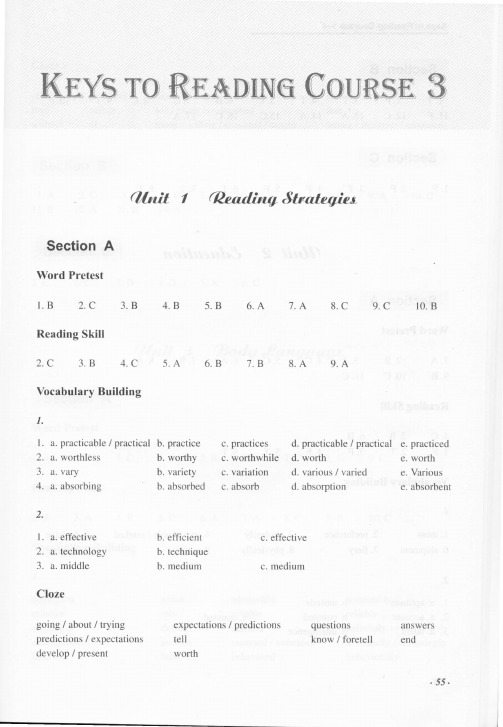
.犭 F.
κ eys to Reading Cou阝
es1-4
∷ ∷ 蛳
∷ ,∷
8.C 9.C 10,C
1,C 2,B 3.B 4。 B 5。 A 6。 C .7.B 11.C 12,B 13.A 14.C 15.C 16.B 17.A
∷ ∷ ∷ ∷ 蛳
1.B 2.B
∷ ∷∷ ,∷
3.C 4.A 5。 B 6,B 7.A 8,C 9.C 10,B
1ifc .62.
some
sort/1ond
space
orbiting`going/circling
asked/wOndcred
have
Keys tO Reading Course3
Ⅱ ving
were
be1ieve
lⅡ
oWn
living
solar
through
where
cly
∷ ∷sectlm∷ B∷ ∷
3.B 13.A
4.F 14.C
5,T 15.C
6.F
7.B
8.C
9.A
10.C
疵矿t
`诋2.F 1.F
3.T
4.F
5.F
6.F
7.T
8.T
9.F
10.T
叼 臼 匕 饪
5
砀
∷ ∷ 蛳
1.C 2.A
∷ ∷ ∷∷
3,A
4.B 5.C
`∷ Word PⅡ etest 6.A
7.C 8.C
9.C
・ 59.
κ ysto Rmdino Coumes1-4 ●
_∷ ∷∷∷ △ ∷
6助山£ 昭
t〃
匍 纽 饧 哆岛 咧 锄 泗
英语泛读教程3第三版Unit3
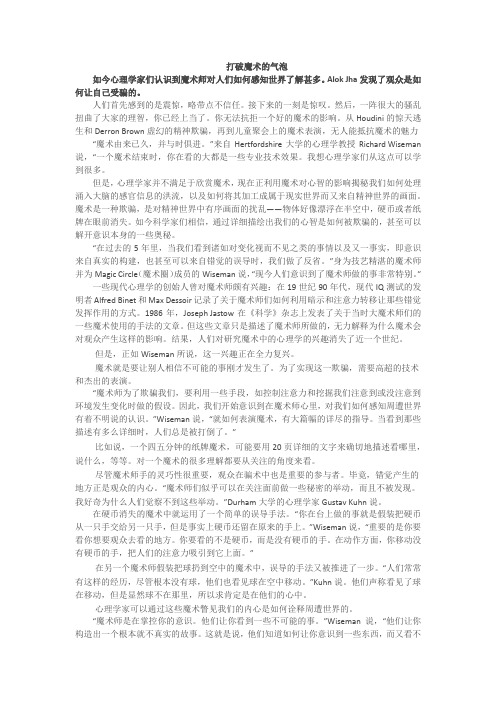
打破魔术的气泡如今心理学家们认识到魔术师对人们如何感知世界了解甚多。
Alok Jha发现了观众是如何让自己受骗的。
人们首先感到的是震惊,略带点不信任。
接下来的一刻是惊叹。
然后,一阵很大的骚乱扭曲了大家的理智,你已经上当了。
你无法抗拒一个好的魔术的影响。
从Houdini的惊天逃生和Derron Brown虚幻的精神欺骗,再到儿童聚会上的魔术表演,无人能抵抗魔术的魅力“魔术由来已久,并与时俱进。
”来自Hertfordshire大学的心理学教授Richard Wiseman 说,“一个魔术结束时,你在看的大都是一些专业技术效果。
我想心理学家们从这点可以学到很多。
但是,心理学家并不满足于欣赏魔术,现在正利用魔术对心智的影响揭秘我们如何处理涌入大脑的感官信息的洪流,以及如何将其加工成属于现实世界而又来自精神世界的画面。
魔术是一种欺骗,是对精神世界中有序画面的扰乱——物体好像漂浮在半空中,硬币或者纸牌在眼前消失。
如今科学家们相信,通过详细描绘出我们的心智是如何被欺骗的,甚至可以解开意识本身的一些奥秘。
“在过去的5年里,当我们看到诸如对变化视而不见之类的事情以及又一事实,即意识来自真实的构建,也甚至可以来自错觉的误导时,我们做了反省。
”身为技艺精湛的魔术师并为Magic Circle(魔术圈)成员的Wiseman说,“现今人们意识到了魔术师做的事非常特别。
”一些现代心理学的创始人曾对魔术师颇有兴趣:在19世纪90年代,现代IQ测试的发明者Alfred Binet和Max Dessoir记录了关于魔术师们如何利用暗示和注意力转移让那些错觉发挥作用的方式。
1986年,Joseph Jastow在《科学》杂志上发表了关于当时大魔术师们的一些魔术使用的手法的文章。
但这些文章只是描述了魔术师所做的,无力解释为什么魔术会对观众产生这样的影响。
结果,人们对研究魔术中的心理学的兴趣消失了近一个世纪。
但是,正如Wiseman所说,这一兴趣正在全力复兴。
Unit 3王守仁《泛读教程》(课堂PPT)
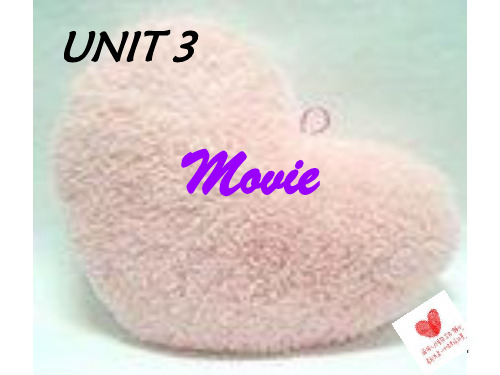
UNIT 3
Movie
1
• Comedy • Tragedy • Soap opera • Series • Romantic movie • Martial art movie • Science-fiction movie • Thriller/ horror film/ scare movie • Slapstick • Documentary
13
▪ 1. confidence ▪ 2. distance ▪ 3. devilish ▪ 4. presence ▪ 5. importance ▪ 6. childish ▪ 7. patience ▪ 8. appearance
14
Practise More
1. When too old to work much, the retired worker was ________ about neighborhood affairs. ( enthusiasm )
C. To introduce a famous special-effects man, Jim White (who is best known for building and crashing airplanes or sending tiny model of ships on dangerous voyages) (Pars.5-6)
D. Fire stunts (Par.7)
E. Explosives (Pars.8-9)
Ⅲ. Conclusion (Par.10)
11
Word Match
❖ 1. scrape ❖ 2. grateful ❖ 3. substitute ❖ 4. expenses ❖ 5. reduce ❖ 6. staring ❖ 7. impressed ❖ 8. floats
英语泛读教程 第三册 Unit Three

VOCABULARY 1. Skeptical about
2. In a heated battle over the issue 3. Dump 4. Genteel 5. Nasty 6. Rise in value 7. Portend 8. Render 9. Increase in yield 10.Scrap 11.Be jumpy about 12.Be fussy about 13.Make sb/sth darling 14.Be mired in 15.Be bolstered by
What are Genetically Modified Food
The term GM foods or GMOs (genetically-modified organisms) is most commonly used to refer toor human or animal consumption using the latest molecular biology techniques. These plants have been modified in the laboratory to enhance desired traits such as increased resistance to herbicides or improved nutritional content. The enhancement of desired traits has traditionally been undertaken through breeding, but conventional plant breeding methods can be very time consuming and are often not very accurate. Genetic engineering, on the other hand, can create plants with the exact desired trait very rapidly and with great accuracy. For example, plant geneticists can isolate a gene responsible for drought tolerance and insert that gene into a different plant. The new genetically-modified plant will gain drought tolerance as well.
英语泛读教程unit3recycling
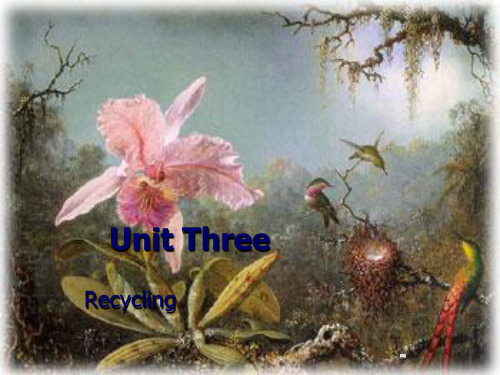
●减少废物,专家建议,尽量购买散装货,买散装水果和蔬菜,不买那些使用多 层塑料纸包装的物品,购买那些容易降解的物品
Well, recycling is a simple way that you, as a consumer,
can help out the environment, create a profitable market for recycled goods and help preserve natural resources from
TYPES of Glass Products can be recycled
•Beverage containers •Food Jars
Benefits of recycling of Recycling glass
✓Can be recycled over again and never lose its quality or quantity ✓Creates 20%less air pollution ✓Reduces water pollution by 50% ✓Saves energy to light a 100-watt light bulb ✓Reduces that amount of landfill space that is used
After recycled, can create…
✓Egg cartons ✓Paper towel ✓Tissue ✓Toilet paper ✓Newspaper ✓Phonebooks
The process of taking old glass products and turning them into new, reusable glass products. Recycling old glass uses 40% less energy than manufacturing it from new.
泛读教程-第三册-课件-答案-Unit-3.ppt
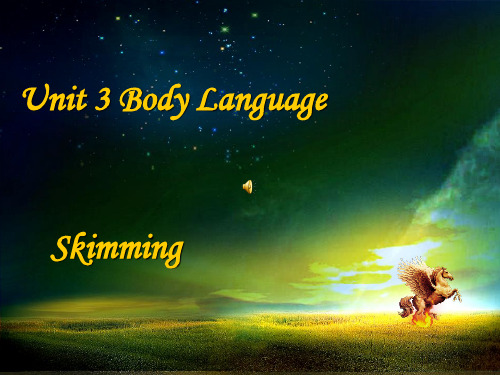
• subvocalizing, which is talking to yourself in your head as you silently read.
- rubber balls and liquor! What did you have for lunch? - rubber balls and liquor! What did you have for dinner? - rubber balls and liquor! - rubber balls and liquor! ★
Unit 3 Body Language Skimming
Contents
Lip-Reading Regression
Eye-Movement Body-Language
Stop talking to yourself when you
read.
• People talk to themselves in 2 ways, by:
• Reading aloud, and subvocalization do have their place in the reading process, but it should be limited and not the norm for one who needs to digest large qualities of material.
Tongue Twister
• 容易型(热身喔) ★The sixth sick sheik‘s sixth sheep’s sick. ★Double bubble gum bubbles double. No double bubble gum doesn‘t bubble double.
Keys to Reading Course 3 泛读教程第三册(王守仁 著)(Unit1~Unit18) 参考答案
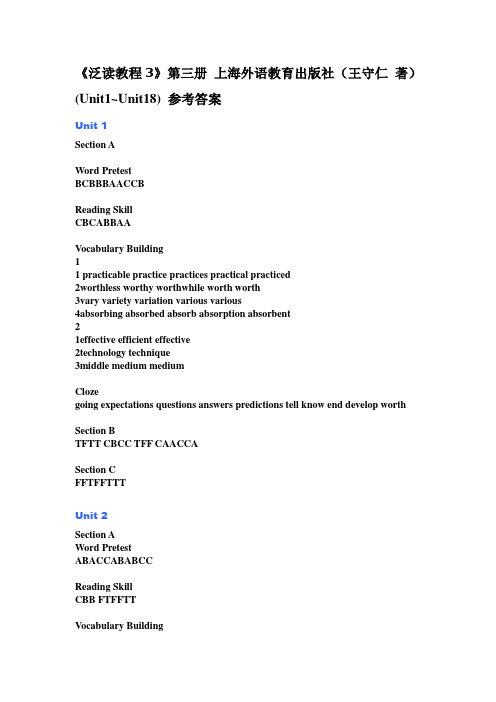
《泛读教程3》第三册上海外语教育出版社(王守仁著)(Unit1~Unit18) 参考答案Unit 1Section AWord PretestBCBBBAACCBReading SkillCBCABBAAVocabulary Building11 practicable practice practices practical practiced2worthless worthy worthwhile worth worth3vary variety variation various various4absorbing absorbed absorb absorption absorbent21effective efficient effective2technology technique3middle medium mediumClozegoing expectations questions answers predictions tell know end develop worth Section BTFTT CBCC TFF CAACCASection CFFTFFTTTUnit 2Section AWord PretestABACCABABCCReading SkillCBB FTFFTTVocabulary Building11mess 2preference 3aimlessly 4remarkable 5decisive 6shipment 7fiery 8physically 9action 10housing21aptitude attitude2account counted counted3talent intelligenceClozeother just has some than refuse see that without if ready wrongSection BACCCCCCCACBABASection CCCDDACUnit 3Section AWord PretestABCCBDCDCReading SkillBABCAACBCVocabulary Building1Admission admit admissible admissiblyReliance rely reliable reliablyDefinition define definite definitelyAssumption assume assumed assumedlyBehavior behave behavioral behaviorallyVariety vary various variouslyPart part partial partiallyManager manage managerial manageriallyCorrelation correlate correlative correlativelyAdaptation adapt adaptive adaptively21inspired aspired inspired2token badges token3contemporaries temporary contemporaryClozeCommunicate ways using in of message meet causes meaning to eyesSection BBABBAC FFTTTF CCBSection CBBDDBCCA FFTFFTUnit 4Section AWord PretestCACAABBBCCReading SkillBBACBCCAAVocabulary Building11moist 2betrayal 3exclusively 4inhumane 5amazed 6endangered 7marvels 8deadly21dessert deserted2favourite favorable favorable3awarded reward awardedClozeParents idea at seen landmarks instance migrate guide pole effect it if experimentsSection BCCB FTF BCACCBACCSection CFFTFFFTTFTUnit 5Section AWord PretestCAABCACCCReading SkillCABCB FFTFTTVocabulary Building1Assumption assume assumed assumedlyAcknowledgement acknowledge acknowledgedlyReflection reflect reflective reflectivelyDomination dominate dominant dominantlyCategory categorize categorical categoricallyImplication imply implicative implicativelyReassurance reassure reassuring reassuringlyDefinition define definite definitely21historical historic2rejected resist3test analyzedClozeExisted over head body found language use single passed ahead survival handlingSection BCABCBB TTTFTT CACSection CBBAAACBCUnit 6Section AWord PretestC ACBABACABABReading SkillCAACACCAVocabulary BuildingAvailability avail available availablyConquest conquer conquering conqueringlyLuxury luxuriate luxurious luxuriouslyOrgin orginate original originallyOccurrence occur occurrentSystem systematize systematical systematicallyPhonology (这个是没有动词形式的)phonological phonologicallyDecision decide decided decidedlyVariety vary various variouslySuperiority (这个是没有动词形式的)superior superiorlyPeculiar particular particularAssess access accessResources source sourcesClozeSex men differs compliment complimenting causes makes languages have outside understood have use circleSection BCBBBACBCCCCBACCBASection CBBCABBACCBUnit 7Section AWord PretestABABCBACReading SkillBBBCCBCBVocabulary BuildingDeduced behavior adhere replacement option delicacy enormous pursuit Inquired required inquire requiredCompatible comparable compatible comparableClozeSatellite some space asked life sort orbiting have living were believe own solar where likely living throughSection BFTFFTTTTTFFFBBCACCSection CBCBCCAEDEBAFDCUnit 8Section AWord PretestBCABCBBCCAReading SkillCBABCBCCCCVocabulary BuildingOccupation occupy occupational occupationallySegregation segregate segregated(这个没有副词)Discrimination discriminate discriminating discriminatinglyEnforcement enforce enforceable enforceablyExclusion exclude exclusive exclusivelyPerseverance persevere persevering perseveringlyConviction convict convictive convectivelyAmendment amend amendable(这个没有副词)Superficiality superficialize superficial superficiallySpectator spectate spectatorial (这个没有副词)Job career jobs careerPrincipal principles principal principleFeminine female feminineClozeAcceptable domestic property wages husband divorce claims legal suit permitted make excluded lacked belonged determinedSection BBACCCCACCCAABBACTTFSection CCCAACBUnit 9Section AWord PretestBAABCACBBABCReading SkillCACCBBBBBACBVocabulary BuildingTypifies dominant familial competitive vibrate descended departure boom countless symbolizesRecreation recreates recreationRhythm rhyme rhymes rhythmClozeSea within of divides built celebrated inside attract together whenSection BFTFTTCCBBCBAACCACSection CBAACABCCCCUnit 10Section AWord PretestCABCBBBBABReading SkillCBCACCCABBVocabulary BuildingConsequence(这个没有动词形式)consequent consequentlySophistication sophisticate sophisticated sophisticatedlyReference refer referable referablyConversation converse conversational conversationallySpace space spatial spatiallyDetachment detach detachable detachablyIntervention intervene intervening(这个没有副词)Type typify typical typicallyAssure ensure assured ensureArises raised rise raised arisenClue cues clue cueClozeWell separating is own close need look order respect follow prior sign help was elseSection BBBCTTFBCACACTFFSection CTFFTFFFFUnit 11Section AWord Pretest1---5 ACBCB 6---8 ABBReading Skill1---5 BCBAC 6---10 CCCCCVocabulary Building1.information inform informative informativelyspecification specify specific specificallyaddition add additional/additive additionally/additivelyspecialty specialize special speciallynarration narrate narrative narrativelyextension extend extensive extensivelyorigin originate original originallyexplosion explode explosive explosivelyambiguity ambiguous ambiguouslyestablishment establish established1.extension2. ambiguity3.original4.specified5. additional6.unambiguously7.explosionrmation9.specialized 10.narrative 11.establishment2.1.a.transform b.transferred c.transferred d.transformed2.a.lonely b.alone c.lonely d.aloneClozelibrary amounted own burned/destroyed by counties’ send suggestion/proposal librarySection B1---5 ACBCB 6---10 ACCAC 11---17 ABABBABSection C1---5 BCACC 6---10 CBCCCUnit 12Section AWord Pretest1---5 CCBBC 6---12 AACCCBAReading Skill1---5 CABBC 6---8 CBBVocabulary Building1.1.reaction2.mass3. polluting4.planetary5.suspicious6.alarming7.emitted8.emerged2.1.a.warned b.threatened2.a.spread b.spread c.sprayed3.a.emergency b.emergenceClozesolve communities creative preventiondisposal resources recycling wasteincrease place measures amountSection B1---5 FFTTB 6----10 CACFT11---15 FFABC 16---18 CBCSection C1---5 BCAAC 6---8 CBCUnit 13Section AWord Pretest1---5 ABAAC 6---10ABCBAReading Skill1---6 CCBABB 1---5 FTFTTVocabulary Building1.symptom symptomize symptomatic symptomatically longing long longing longinglyaddition add additional/additive additionally/additively manifestation manifest manifest manifestlydepression depress depressed/depressing depressedly/depressing invariability invariable invariablyseparation separate separate separately condemnation condemn condemnable condemnably imagination imagine imaginary imaginarilyaffection affect affecting affectingly2.1.a.remedies b.recipe c.remedy d.recipe2.a.alternate b.altered c.alternate d.alter3.a.acknowledged b.knowledge c.acknowledgedClozestep acknowledge prevent essentialphysician due physical psychosomaticdisease confidence symptoms thoroughemotional upsettingSection B1---5 CBCAB 6---10 CBBCB 11---15 ABCACSection C1---5 TFFFT 6----10 FTFFFUnit 14Section AWord pretest1---5 BCABA 6---8 CBAReading Skill1---4 CACC 1---4 TTFTVocabulary Building1.1.reluctant2.evolution3.attributed4.catastrophic5.associate6.indifferent7.emerged8.stir2.1.a.evolved b.revolves c.evolved2.a.dismay b.dismal c.dismal d.dismay3.a.contribute b.attributed c.contributed d.attributed Clozecharacteristic/trait/nature changed/had to longget/eat possessed/developed/had stretched/lengthened longer passed After have theoryeffect/influence notion/idea changeSection B1---5 DABFT 6---10 FTFDA 11---17 DBACFTF Section C1---8 TFTFTFTFUnit 15Section AWord Pretest1---5 BBADA 6---11 DBBDCCReading Skill1---5: A A C C C 6—10: B B A B BVocabulary Building1.prevention prevent preventive preventivelyfederation federate federal federallyinadequacy / inadequate inadequatelydeception deceive deceptive deceptivelyprosperity prosper prosperous prosperouslylife live live/living/alive /effect effect effective effectivelyevaluation evaluate evaluable/evaluative /resident reside residential residentiallyvision vision visional/visionary visionally/visionarily 1. evaluation 2. federal 3.prospertiy 4. residential5. effect6. are living7. deceptively8. preventive/effective 2.1.a.simile b.,metaphor2. a.ultimate b.unanimous c.ultimate d.unanimous Clozetransportation distance/away ground Stemtrains electric station/stop name train threetrains stairs/steps passengers/peopleSection B1---6 D C D C C C 7---12 C C A B C BSection C1--- 8 C C A C C C C CUnit 16Section AWord pretest1-8: C C B B B B B CReading skill1-6: B A C C B CVocabulary building1.1. identification2. arbitrary3. practical4. foundation5. logic6. dictatorial7.occurence8. revise2.1. a. presentation b. representation c. presentationd. representation2. a. base b. base c. basis d. basisClozeclocks wall pendulum ground/floor woodmakers names clocks/timepieces invented/created/madefake/false/imitatedSection B1.A2.A3.C4.F5.T6.F7.T8.T9.T 10.T 11.B 12.C 13.C 14.C 15.A 16.ASection C1-8: A B A D D D C AUnit 17Section AWord Pretest1---5 CCACA 6---10 BCCBCReading Skill1---3 CCC 1---7 TFTFFFTVocabulary Building1.contradiction contradict contradictory contradictorily center center central centrallyseduction seduce seductive seductivelynecessity necessitate necessary necessarilyvisibility visualize visible visiblymobilization mobilize mobilizable mobilizably function function functional functionally dominance dominate dominant dominantly selection select selective selectivelyvocality vocalize vocal vocally1.visibility2.necessities3.seductive4.mobilize5.central6.functioning7.vocal8.dominant9.contradictory 10.selected2.1.a.immersed b.emerged c.immersed d.emerged2.a.dormant b.dominant c.Dormant d.dominant Clozenumber happening house saidgraduates viewing TV schoolcases children reaches/draws imitatewatching practice face backSection B1---1 CBBCB 6---10 FFFTC 11---15 ACBBC Section C1---5 TTFTF 6---10 FFFTTUnit 18Questions on “If”1---5 AAABCQuestions on “The Rose Family”1---3 ABBQuestion on “My Candle Burns at Both Its Ends”1—3 BBCQuestions on “The Negro Speaks of Rivers”1---3 CBBQuestions on “I Wandered Lonely as a Cloud”1---5 ACCBC 6---7 BCQuestions on “Sonnet 29”1---5 ABBCBQuestions on “In School Days”1---4 ABBC。
泛读教程 第三册 课件 答案 Unit 3
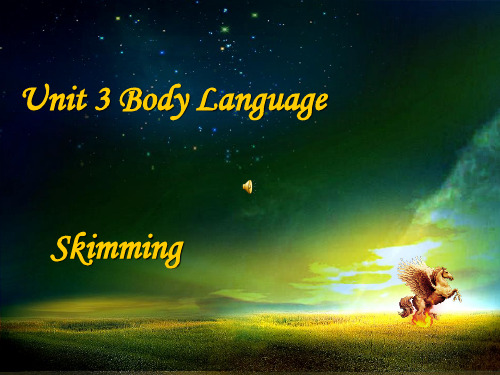
• ★Out in the pasture the nature watcher watches the catcher. While the catcher watches the pitcher who pitches the balls. Whether the temperature's up or whether the temperature's down, the nature watcher, the catcher and the pitcher are always around. The pitcher pitches, the catcher catches and the watcher watches. So whether the temperature's rises or whether the temperature falls the nature watcher just watches the catcher who's watching the pitcher who's watching the balls.★
Regression
• John scheduled scheduled an appointment an appointment scheduled an appointment with his advisor with his advisor so that he that he so that he could arrange his program program of courses of courses arrange his program of courses for the coming semester coming semester for the coming semester .
英语泛读教程3第三版答案
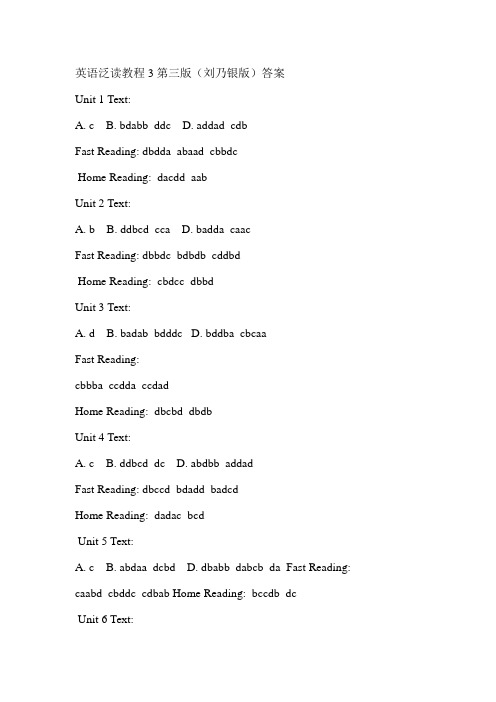
英语泛读教程3第三版(刘乃银版)答案Unit 1 Text:A. cB. bdabb ddc D. addad cdbFast Reading: dbdda abaad cbbdcHome Reading: dacdd aabUnit 2 Text:A. bB. ddbcd cca D. badda caacFast Reading: dbbdc bdbdb cddbdHome Reading: cbdcc dbbdUnit 3 Text:A. dB. badab bdddc D. bddba cbcaaFast Reading:cbbba ccdda ccdadHome Reading: dbcbd dbdbUnit 4 Text:A. cB. ddbcd dc D. abdbb addadFast Reading: dbccd bdadd badcdHome Reading: dadac bcdUnit 5 Text:A. cB. abdaa dcbd D. dbabb dabcb da Fast Reading: caabd cbddc cdbab Home Reading: bccdb dcUnit 6 Text:A. bB. cbcab ddad D. badaa cbaacFast Reading: cabcd aadcb ccdabHome Reading: ccdcd abcUnit 7Text:A. dB. acbda dcaac D. abaac daccd adFast Reading:daada cddbc bdcdb Home Reading: cbadb cddbcUnit 8 Text:A. cB. cddcc dccb D. abdac aaaFast Reading:ccacd bbdad babddHome Reading: dbdbc cbcdUnit 9 Text:A. cB. bccbc dbba D. dcbab dacba c Fast Reading:dcbca bccbc bcddd Home Reading: dcdca bdUnit 10 Text:A. cB. cdccd bacac D. dcdbc acadc bd Fast Reading:dbdcc dccdb bddca Home Reading: cadcb acbbUnit 11 Text:A. dB. adacc dcb D. abacb dcaab adc Fast Reading: dcdab ccbda ccbca Home Reading: bcadb bcdddUnit 12 Text:A. bB. bbbdd ccc D. cdccd acdba dca Fast Reading:bbddc dbdbc cdcdd Home Reading: bcdcc badbb c Unit13 Text:A. cB. cdcad bab D. cbada cabdbFast Reading:cdacc caccd bdbdb Home Reading: bdbcc bdd Unit 14 Text:A. cB. ddcad dab D. dacad babad bFast Reading:ddabb bddca dcccb Home Reading: cdcda ddUnit 15 Text:A. cB. abbac bccdb b D. babcc aaacd bb Fast Reading: caccb accd c ddada Home Reading: cdacd ddc。
泛读三课后练习答案
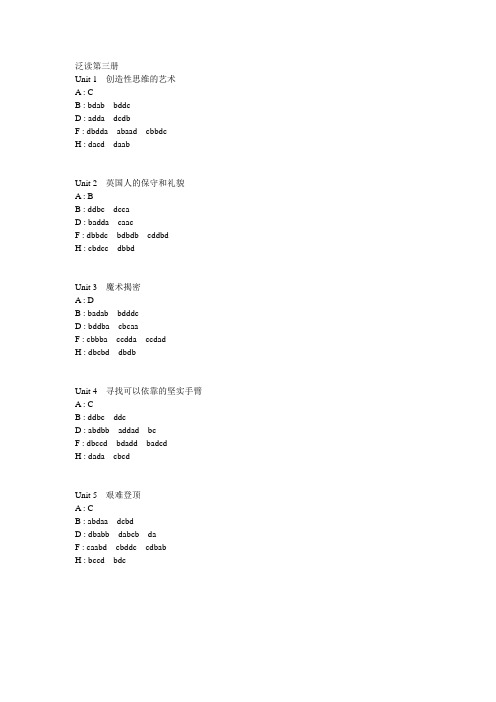
泛读第三册Unit 1 创造性思维的艺术A : CB : bdab bddcD : adda dcdbF : dbdda abaad cbbdcH : dacd daabUnit 2 英国人的保守和礼貌A : BB : ddbc dccaD : badda caacF : dbbdc bdbdb cddbdH : cbdcc dbbdUnit 3 魔术揭密A : DB : badab bdddcD : bddba cbcaaF : cbbba ccdda ccdadH : dbcbd dbdbUnit 4 寻找可以依靠的坚实手臂A : CB : ddbc ddcD : abdbb addad bcF : dbccd bdadd badcdH : dada cbcdUnit 5 艰难登顶A : CB : abdaa dcbdD : dbabb dabcb daF : caabd cbddc cdbabH : bccd bdcUnit 6 药对了,病人错了A : BB : cbcab ddadD : badaa cbaac abF : cabcd aadcb ccdabH : ccdc dabcUnit 7 自己的房间A : DB : acbda dcaacD : abaac daccd adF : daada cddbc bdcdbH : cbadb cddbcUnit 8 假如我有三天光阴A : CB : cddcc dccbD : abda caaaF : ccacd bbdad babddH : dbdbc cbcdUnit 9 梦与睡眠一样重要吗A : CB : bccbc dbbaD : dcbab dacbacF : dcbca bccbc bcdddH : dcdc abdUnit 10 诚信原则A : CB : cdccd bacacD : dcdbc acadc bdF : dbdcc dccdb bddcaH : cadcb acbbUnit 11 非语言交际A : DB : adac cdcbD : abacb dcaab adcF : dcdab ccbda ccbcaH : bcadb bcdddUnit 12 你为何如此聪明A : BB : bbbd dcccD : cdccd acdba dcaF : bbddc dbdbc cdcddH : bcdcc badbbcUnit 13 道德,猿和我们A : AB : cdca dbabD : cbada cabdbF : cdacc caccd bdbdbH : bdbc cbddUnit 14 你怎么知道艺术品的优劣A : CB : ddca ddabD : dacad babadbF : ddabb bddca dcccbH : cdcd addUnit 15 热爱生命A : CB : abbac bccdbbD :babcc aaacd bbF : caccb accdc ddadaH : cdac dddc。
泛读教程 第三册 cloze 答案 原文

Unit1。
The ability to predict what the writer is going/ about/ trying to say next is both an aid to understanding and a sign of it.A prediction begins from the moment you read the title and from expectations of what he book is likely to contain。
Even if the expectations/predictions are contradicted, they are useful because they have started you thinking about the topic and made you actively involved。
If you formulate your predictions as questions which you think the text may answer, you are preparing yourself to read for a purpose: to see which of your questions are in fact dealt with and what answers are offered。
If your reading is more purposeful you are likely to understand better.Naturally your predictions/expectations will not always be correct。
This does not matter at all as long as you recognize when they are wrong, and why. In fact mistaken predictions can tell you the source of misunderstanding and help you to avoid certain false assumptions。
英语泛读3答案__王守仁
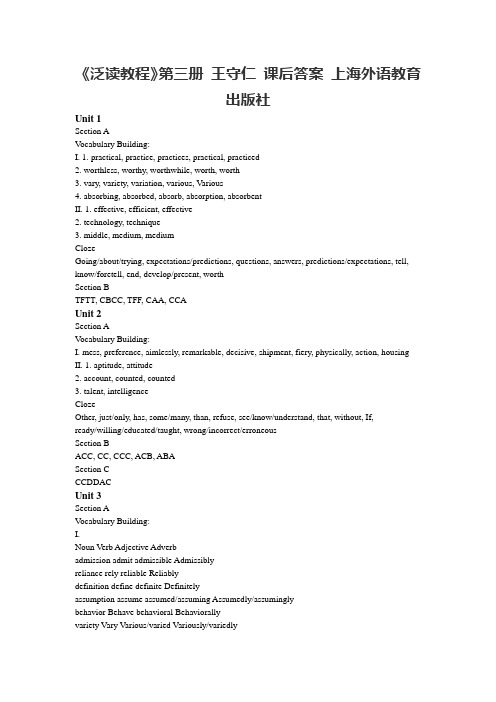
《泛读教程》第三册王守仁课后答案上海外语教育出版社Unit 1Section AV ocabulary Building:I. 1. practical, practice, practices, practical, practiced2. worthless, worthy, worthwhile, worth, worth3. vary, variety, variation, various, Various4. absorbing, absorbed, absorb, absorption, absorbentII. 1. effective, efficient, effective2. technology, technique3. middle, medium, mediumClozeGoing/about/trying, expectations/predictions, questions, answers, predictions/expectations, tell, know/foretell, end, develop/present, worthSection BTFTT, CBCC, TFF, CAA, CCAUnit 2Section AV ocabulary Building:I. mess, preference, aimlessly, remarkable, decisive, shipment, fiery, physically, action, housing II. 1. aptitude, attitude2. account, counted, counted3. talent, intelligenceClozeOther, just/only, has, some/many, than, refuse, see/know/understand, that, without, If,ready/willing/educated/taught, wrong/incorrect/erroneousSection BACC, CC, CCC, ACB, ABASection CCCDDACUnit 3Section AV ocabulary Building:I.Noun Verb Adjective Adverbadmission admit admissible Admissiblyreliance rely reliable Reliablydefinition define definite Definitelyassumption assume assumed/assuming Assumedly/assuminglybehavior Behave behavioral Behaviorallyvariety Vary Various/varied Variously/variedlyPart/partiality Part partial Partiallymanager manage managerial Manageriallycorrelation correlate correlative CorrelativelyAdaptation adapt adaptive adaptivelyII. 1. inspired, aspired, inspired2. token, badges, token3. contemporaries, temporary, contemporaryClozeCommunicate, ways/means/ones, using/saying, in, of, message, meet/have/encounter/experience, causes, meaning, to, eyesSection BBAB, BAC, FFT, TTF, CCBSection CBBDDBCCAFFTFFTUnit 4Section AReading Skill: Skimming2-10 BBAC BCCAAV ocabulary Building:I. moist, betrayal, exclusively, inhumane, amazed / amazing, endangered, marvels, deadlyII. 1. dessert, deserted2. favorite, favorable, favorable3. awarded, reward, awardedClozeParents, idea, at / by, seen, landmarks, instance / example, migrate, guide /direct, pole, effect / influence, It / This, if / whether, experimentsSection BCCB FTF BCA CCB ACCSection CFFTFF FTTFFUnit 5Section AV ocabulary Building:I.Noun Verb Adjective Adverbassumption assume assumed / assuming assumedly /assuminglyacknowledgement acknowledge acknowledged acknowledgedlyreflection reflect reflective reflectivelydomination dominate dominant dominantlycategory categorize categorical categoricallyimplication imply implicative implicativelyreassurance reassure reassuring reassuringlydefinition define definite definitelyII. 1. Historical, historic2. rejected, resist3. test / analyze, analyzedClozeExisted / appeared, ever, head /brain, body, found, language, use / value / significance/ importance, single, passed, ahead, survival / existence, handling / overcomingSection BCAB CBB TTT FTT CACSection CBBAA ACBCUnit 6Section AWord Pretest:CACBA BACAB ABV ocabulary Building:I.availability avail available Availablyconquest conquer Conquering /conqueredConqueringlyluxury luxuriate luxurious Luxuriouslyorigin originate original Originallyoccurrence occur Occurrentsystem systematize Systematical /systematicSystematicallyphonology phonological Phonologicallydecision decide Decided/decisive Decidedly / decisivelyvariety vary various Variouslysuperiority superior SuperiorlyII. 1. peculiar, particular, particular2. assess, access, access3. resources, source, sourcesClozeSex, Men, differs, compliment / words, complimenting, causes, makes, languages, have, outside, understood, have, use, circle / world / fieldSection BCBBBA CBCCC CBACC BASection CBBCAB BACCBUnit 7Section AWord PretestABABC BACV ocabulary Building:I. deduced, behavior, adhere, replacement, option, delicacy, enormous, pursuitII. 1. inquired, required, inquire, required2. compatible, comparable, compatible, comparableClozeSatellite, some, space, asked / wondered, life, sort / kind, orbiting / going / circling, have, living, were, believe, own, solar, where, likely, living, throughSection BFTFFT TTTTF FFBBC ACCSection CBCBCC AEDEBAFDCUnit 8Section AV ocabulary Building:1.occupataion, occupy, occupational, occupationallysegregation, segregate, segregateddiscrimination, discriminate, discriminating / discriminatory, discriminatingly / discriminatorily enforcement, enforce, enforceable, enforceablyexclusion, exclude, exclusive, exclusivelyperseverance, persevere, persevering, perseveringlyconviction, convict, convictive, convictivelyamendment, amend, amendablesuperficiality, superficialize, superficial, superficiallyspectator, spectate, spectatorial2.1. a. job b. career c. jobs d. career2. a.. principal b. principles c. principal d. principle3. a. feminien b. female c. feminineClozeAcceptable, domestic, property, wages, husband, divorce, claims, legal, suit, permitted, make, excluded, lacked, belonged, determinedSection BBACCB CACCC AABBA C TTFSection CCCAACBUnit 9Section AV ocabulary Building:1.1. typifies2. dominant3. familial4. competitive5. vibrate6. descended7. departure8. boom9. countless 10. symbolizes2.1. a. recreative b. recreates c. recreation2. a. rhythm b. rhyme c. rhymes d. rhythmClozeSea, within, of, divides, built/constructed/completed, celebrated, inside/in, attract, together, when Section BFTFTT CCBBC BAACC ACSection CBAACA BCCCCUnit 10Section AV ocabulary Building:1.consequence, , consequent / consequential, consequently / consequentiallysophisticatiion, sophisticate, sophisticated, sophisticatedlyreference, refer, referable, referablyconversation, converse, conversational, conversationallyspace, space, spatial/spacious, spatially/spaciouslydetachment, detach, detachable/detached, detachably/detachedlyintervention, intervene, interveningtype, typify, typical, typically2.1. assure, ensure, assured, ensure2. arises, raised, rise, raised, arisen3. clue, cues, clue, cueClozeWell, separating / isolating, is, own, close, need, look, order, respect, follow, prior, sign/cue, help, was/were, elseSection BBBC TTF BCA CAC TFFSection CTFFTF FFFUnit 11Section AV ocabulary Building:1.information, inform, informative, informativelyspecification, specify, specific, specificallyaddition, add, additional /additive, additionally / additivelyspecialty, specialize, special, speciallynarration, narrate, narrative, narrativelyextension, extend, exxtensive, extensivelyorigin, originate, original, originallyexplosion, explode, explosive, explosivelyambiguity, , ambiguous, ambiguouslyestablishment, establish, established1. extension2. mabiguity3. orignal4. specified5. additional6. unambiguously7. explosion8. information9. specialized 10. narrative 11. establishment2.1. transform, transferred, transferred, transformed2. lonely, alone, lonely, aloneClozeLibrary, amounted, own, burned / destroyed, countries’, send, suggestion / proposal, library Section BACBCB ACCAC ABABB ABSection CBCACC CBCCCUnit 12Section AV ocabulary Building:1. reaction, mass, polluting, planetary, suspicious, alarming, emitted, emerged2.1. warned, threatened2. spread, spread, sprayed3. emergency, emergenceClozeSolve, communities, creative, prevention, disposal, resources, recycloing, waste, increase, place, measures, amountSection BFFTT BCAC FTFF ABC CBCSection CBCAAC CBCUnit 13Section AV ocabulary Building:1.symptom, symptomize, symptomatic, symptomaticallylonging, long, longing, longinglyaddition, add, additional additive, additionally / additivelymanifestation, manifest, manifest, manifestlydepression, depress, depressed / depressing, depressedly / depressinglyinvariability, , invariable, invariablyseparation, separate, separate, separatelycondemnation, condemn, condemnable, condemnablyimagination, imagine, imaginary, imaginarilyaffection, affect, affecting, afeectingly2.1. remedies, recipe, remedy, recipe2. alternate, altered, alternate, alter3. acknowledged, knowledge, acknowledgedClozeStep, acknowledge, prevent, essential, physician, due, physical, psychosomatic, disease, confidence, symptoms, thorough, emotional, upsettingSection BCBCAB CBBCB ABCACSection CTFFFT FTFFFUnit 14Section AV ocabulary Building:1. reluctant, evolution, atrributed, catastrophic, assoicate, indifferent, emerged, stir2.1. evolved, revolved, evolved2. dismay, dismal, dismal, dismay3. contribute, attributed, contributed, attributedClozeCharacteristic / trait / nature, changed / had, to, long, get/eat, possessed / developed /had, stretched /lengthened, longer, passed, After, have, theory, effect/influence, notion/idea, changeSection BDAB FTFTF DAD BAC FTFSection CTFTFT FTFUnit 15Section AV ocabulary Building:1.Prevention, prevent, preventive, preventivelyFederation, federate, federal, federallyInadequacy, , inadequate, inadequatelyDeception, deceive, deceptive, deceptivelyProsperity, prosper, prosperous, prosperouslyLife, live, live/living/aliveEffect, effect, effective, effectivelyEvaluation, evaluate, evaluable /evaluativeResident, reside, residential, residentiallyVision, vision, visional /visionary, visionally / visionarity1. evaluabtion,2. federal3. prosperity4. residential5. effect6. are living7. deceptively8. preventive /effective2.1. simile, metaphor2. ultimate, unanimous, ultimate, unanimousClozeTransportation, distance / away, ground, Steam, trains, electric, station /stop, name, train, three, trains, stairs/steps, passengers/peopleSection BDCDCC CCCAB CBSection CCCACC CCC。
英语泛读教程3__unit_3词汇表和课堂思考题
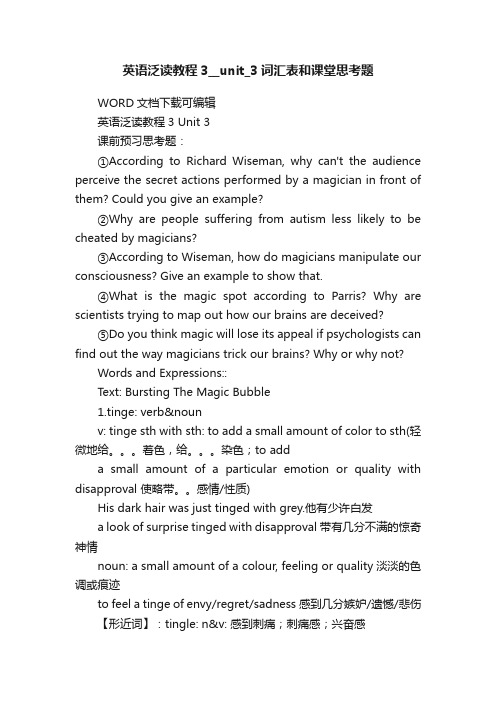
英语泛读教程3__unit_3词汇表和课堂思考题WORD文档下载可编辑英语泛读教程3 Unit 3课前预习思考题:①According to Richard Wiseman, why can't the audience perceive the secret actions performed by a magician in front of them? Could you give an example?②Why are people suffering from autism less likely to be cheated by magicians?③According to Wiseman, how do magicians manipulate our consciousness? Give an example to show that.④What is the magic spot according to Parris? Why ar e scientists trying to map out how our brains are deceived?⑤Do you think magic will lose its appeal if psychologists can find out the way magicians trick our brains? Why or why not?Words and Expressions::Text: Bursting The Magic Bubble1.tinge: verb&nounv: tinge sth with sth: to add a small amount of color to sth(轻微地给。
着色,给。
染色;to adda small amount of a particular emotion or quality with disapproval 使略带。
泛读教程--第三册--cloze-答案-原文
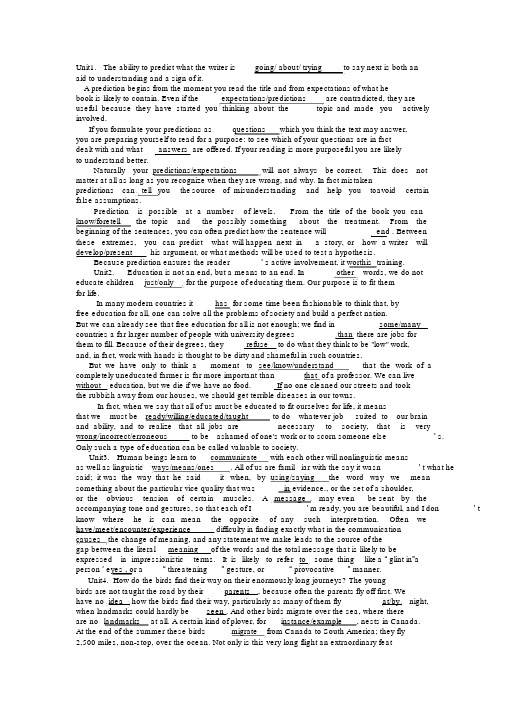
Unit1.The ability to predict what the writer is going/ about/ trying to say next is both anaid to understanding and a sign of it.A prediction begins from the moment you read the title and from expectations of what hebook is likely to contain. Even if the expectations/predictions are contradicted, they areuseful because they have started you thinking about the topic and made you activelyinvolved.If you formulate your predictions as questions which you think the text may answer,you are preparing yourself to read for a purpose: to see which of your questions are in factdealt with and what answers are offered. If your reading is more purposeful you are likelyto understand better.Naturally your predictions/expectations will not always be correct.This does notmatter at all as long as you recognize when they are wrong, and why. In fact mistakenpredictions can tell you the source of misunderstanding and help you to a void certainfalse assumptions.Prediction is possible at a number of levels.From the title of the book you canknow/foretell the topic and the possibly something about the treatment.From thebeginning of the sentences, you can often predict how the sentence will end . Betweenthese extremes,you can predict what will happen next in a story,or how a writer willdevelop/present his argument, or what methods will be used to test a hypothesis.Because prediction ensures the reader’ s active involvement, it worthis training.cation is not an end, but a means to an end. In other words, we do noteducate children just/only for the purpose of educating them. Our purpose is to fit themfor life.In many modern countries it has for some time been fashionable to think that, byfree education for all, one can solve all the problems of society and build a perfect nation.But we can already see that free education for all is not enough; we find in some/manycountries a far larger number of people with university degrees than there are jobs forthem to fill. Because of their degrees, they refuse to do what they think to be "low" work,and, in fact, work with hands is thought to be dirty and shameful in such countries.But we have only to think a moment to see/know/understand that the work of acompletely uneducated farmer is far more important than that of a professor. We can livewithout education, but we die if we have no food.If no one cleaned our streets and tookthe rubbish away from our houses, we should get terrible diseases in our towns.In fact, when we say that all of us must be educated to fit ourselves for life, it meansthat we must be ready/willing/educated/taught to do whatever job suited to our brainand ability, and to realize that all jobs are necessary to society,that is verywrong/incorrect/erroneous to be ashamed of one's work or to scorn someone else’ s.Only such a type of education can be called valuable to society.Unit3.Human beings learn to communicate with each other will nonlinguistic meansas well as linguistic ways/means/ones. All of us are famil iar with the say it wasn’ t what he said; it was the way that he said it when,by using/saying the word way we meansomething about the particular vice quality that was in evidence., or the set of a shoulder,or the obvious tension of certain muscles.A message may even be sent by the accompanying tone and gestures, so that each of I’ m ready, you are beautiful, and I don’ t know where he is can mean the opposite of any such interpretation.Often wehave/meet/encounter/experience difficulty in finding exactly what in the communicationcauses the change of meaning, and any statement we make leads to the source of thegap between the literal meaning of the words and the total message that is likely to beexpressed in impressionistic terms.It is likely to refer to some thing like a “ glint in”aperson ’ eyes , or a“ threatening” gesture, or“ provocative” manner.Unit4. How do the birds find their way on their enormously long journeys? The youngbirds are not taught the road by their parents, because often the parents fly off first. Wehave no idea how the birds find their way, particularly as many of them fly at/by night,when landmarks could hardly be seen . And other birds migrate over the sea, where thereare no landmarks at all. A certain kind of plover, for instance/example, nests in Canada.At the end of the summer these birds migrate from Canada to South America; they fly2,500 miles, non-stop, over the ocean. Not only is this very long flight an extraordinary featof endurance, but there are no landmarks on the ocean to guide/direct the birds.It has been suggested that birds can sense the magnetic lines of force stretching from thenorth to south magnetic pole of the earth, and so direct themselves. But all experimentshitherto made to see whether magnetism has any effect/influence whatsoever onanimals have given negative results. Still,where there is such a biological mystery as migration,even improbable experiments are worth trying.It/this was being done inPoland, before the invasion of that country, on the possible influence of magnetism onpath- finding.Magnets were attached to the birds’heads to see if/whether theirdirection-sense was confused thereby. These unfinished experiments had, of course, tobe stopped.Unit5.Man first existed on earth half a million years ago. Then he was little more thanan animal; but early man had several big advantages over the animals. He had a largehead/brain, he had an upright body , he had clever hands; he had in his brain specialgroups of nerve cells, not found in animals, that enabled him to invent a language anduse it to communicate with his fellow men.The ability to speak was of very greatuse/value/significance/importance because it was allowed men to share ideas, and toplan together,so that tasks impossible for a single person could be successfullyunder-taken by intelligent team-work. Speech also enabled ideas to be passed on fromgeneration to generation so that the stock of human knowledge slowly increased.It was these special advantages that put men far ahead of all other living creatures inthe struggle for survival/existence. They can use their intelligence handing/overcomingtheir difficulties and master them.nguage varies according to sex and occupation.The language of mandiffers subtly from that of women.Men do not usually use expressions such as“ its darling,” andwomen tend not to swear as extensively as men. Likewise, the languageused in addressing men and women differs subtly: we can compliment a man on a newnecktie with the compliment/words“ what a pretty tie, that is!” but not with“ how pretty you look today! ”----an expression reserved for complimenting a woman.The occupation of a person causes his language to vary, particular in the use he makes oftechnical terms, that is, in the use he makes of the jargon of his vacation. Soldiers, dentist,hairdressers,mechanics,yachtsmen,and skiers all have their particular special languages. Sometimes the consequence is that such persons have difficulty in communicating with people outside the vacation on professional maters because thetechnical vocabulary is not understood by all. Although we can relate certain kinds ofjargon to levels of occupation and professional training,we must also note that all occupations have some jargon, even these of the criminal underworld. There may well bea more highly developed use of jargon in occupations that require considerable education,in which words,and the concepts they use , are manipulated rather than objects,forexample in the legal and teaching circle/world/field and in the world of finance.Unit7. The space age began on October 4, 1957, when Sputnik I was launched. Thisfirst man-made satellite was followed by many others,some of which went around thesun. Now the conquest of the space between the planets, and between the earth and thesun, continues at a rapid rate.Each mew satellite and space probe gives scientists new information. As men exploreouter space,some of the questions they have long asked/wondered about will beanswered at last.The greatest question of all concerns life itself. Is there intelligent life out side theearth? Are there people, or creatures of some sort/kind living on Mars, Venus, or someother planet of the solar system? Are there planets orbiting/going/circling around starsother than our sun?The only kind of life we know about would have to be upon a planet.Only a planetwould have the temperatures and gas that all living things seem to need. Until a shorttime ago, we thought there were only a few planets. Today, scientists believe that manystars have planets going around them.We know that there are nine planets in our own solar system-Mercury, Venus, Earth,Mars, Jupiter, Saturn, Uranus, Neptune and Pluto. If any other planets exist in our solarsystem, or anywhere else, our telescopes are not powerful enough to pick up their feeblereflected light. But astronomers guess that one star in a hundred has at least one planetwhere life could exist.We are quite sure that life could begin on a young planet. A new plant would be likelyto contain great seas, together with heavy clouds of water vapor and other gases. Electricstorms would be common. It is possible that simple living cells might from when electricitypassed through the clouds.An experiment made in1952at the University of C hicagoseems to prove this. By passing electricity through nonliving materials, scientist madecells like those of living creatures.Unit8.At the beginning of the nineteenth century the only acceptable roles forwomen were domestic there was virtually nothing for them to do except stay at home orhire out as maids, governesses, and, before long, teachers. Women were not allowed toown property-in most cases, not even the clothes they wore. A working wife was notallowed to keep her wages but was required to turn them over to her husband. In case ofseparation or divorce, a woman had no legal claims on her husband and was not allowedto keep the children. She had to legal status, which meant that she was not permitted tobring suit or to give testimony in courts. Often, she was not permitted to inherit propertyor to make a will. She was barred from public office and excluded form public lifegenerally.For the most part,women lacked opportunities for education,vocationaltraining, and professional employment. The national consensus was that women belongin the home, and determined efforts were made to see that they stayed there.Unit9.Sydney’ s best feature is her harbor.Most Sydneysid ers can see at least aglimpse of blue sea from their windows.Nearly everyone lives within an hour from abeach.On weekends sails of all shapes,sizes and colors glide across the water.Watching the yacht races is a favorite Saturday activity.The harbor divides Sydney into north and south sections. The harbor bridge connectsthe two. It was built in 1932 and cost 20 million.Another Sydney symbol stands on the harbor shore.Sydney’ s magnificent operahouse celebrated its20th anniversary last year.Danish designer Jorn Utzon won aninternational contest with his design. The structure contains several auditoria and theaters.But not all concerts are held in the building. Sunday afternoon concerts on the building’ souter walk attract many listeners.Sydney’ strendy suburb is Paddington.Houses are tightly packed together. Manywere first built for Victorian artists. Now fashionable shops, restaurants, arts galleries andinteresting people fill the area.The best time to visit is Saturday, when vendors selleverything. So there is one of the world’ s most attractive---citiesSydney, Austrian.Unit 10Architectural design influences how privacy is achieved as well as how social contact ismade in public places. The concept of privacy is not unique to a particular culture but what it means isculturally determined.People in the United States tend to achieve privacy by physically separating themselves from others. Theexpression“ good fences make good neighbors” is a preference for privacy from neighbors’ hom can afford it, each child has his or her own bedroom. When privacy is needed, family members may closetheir bedroom doors.In some cultures when individuals need privacy, it is acceptable for them simply to look into themselves. Thatis, they do not need to remove themselves physically from a group in order to achieve privacy.Young American children learn the rule “ knockbefore you enter which”teaches them to respect others ’privacy. Parents, too, often follow this rule priorto entering their children’ s rooms. When a bedroom door is closed it may be a(n) sign to others saying,““I Ineed’m privacy,angry,“”Do ornot” disturb. I’ busy.” For Americans, the physical division of space and the use of architectural features permit a sense of privacy.The way space is used to help the individual to achieve privacy, to build homes or to design cities if culturally influenced. Dr. Hall summarizes the relationship between individuals and their physical surroundings:Man and his extensions constitute one interrelated system. It is a mistake to act as though man was onething and his house or his cities, or his language wee something else.Unit11.The Library of Congress is the largest library in the world.Its books,pamphlets, documents, manuscripts, official, papers, photographs, and prints amount tosome86million items---a number that swells day by day----housed on535miles ofshelves.Congress authorized a library in 1800, which amounted to three thousand books and afew maps when it was destroyed when the British burned the Capitol in 1814. to replace it,Thomas Jefferson sold the government his own library of almost 6500 volumes---thefinest in the nation at the time. The collection, again housed in the Capitol, had grown to55000 when a fire burned more than half of it. In1866 a portion of the Smithsonian Institution library’s was added to the library of Congress,and in the same year the government entered an international program by which copies of U.S. documents wereexchanged for those of other countries. The copyright law of 1870 ensured the librarywould always be up to date by requiring publishers to send two copies of each book published to the library in order to obtain copyright.By 1870 the collections had outgrown its Capitol quarters. A suggestion to raise the Capitol dome and fill it with bookshelves was rejected, and in 1873 Congress authorized acompetition for the design of a library building. A variety of disputes delayed constructionfor more than a de cade, but the library’ s Thomas Jefferson Building was finally opened in 1897.Unit12.As a nation, we starting to realize that we can solve the’t solid waste dilemmajust by finding new places to put trash. Across the country, many individuals, communities and business have found creative ways to reduce and better manage theirtrash through a coordinated mix of practices that includes source reduction.Simply put source reduction is waste prevention.It includes many actions that reducethe disposal amount and harmfulness of waste created. Source reduction can conserveresources, reduce pollution, and help cut waste disposal and handing costs (it avoids thecosts of recycling, landfilling, and combustion).Source reduction is a basic solution to too much garbage: less waste means less of awaste problem. Because source reduction actually prevents the increase of waste in thefirst place ,it comes before other measures that deal with trash after it is already generated. After source reduction, recycling is the preferred waste management optionbecause it reduces the amount of waste going to landfills and conserves resources.Unit13.The first step in helping the patient is to accept and acknowledge his illness.The cause of symptoms must be found, and measures to relieve them and to prevent recurrence must be taken. Thorough examinations are essential. Although the physicianmay suspect that the illness is due to emotional rather than physical cause,he mustsearch carefully for any evidence of physical disease.It is not unknown for an illness considered psychosomatic to be later diagnosed as cancer or some other disease. The thorough search for physical causes of the symptoms helps to gain the patient ’ s confidence. He knows that his condition and symptoms are being taken seriously. If noorganic basis for his complaints is found, he usually will find this news easier to acceptwhen he knows he has had a thorough examination.Finding no physical cause for thedisorder points the way to understandi ng the patient’ s condition. What is the cause? Is it emotional stress?If so,what kind?What are the problems which are upsetting the patients?Unit14.The work of French scientist Jean Baptiste Lamarck(1744-1829)has contributed to the theory of evolution. Lamarck believed that the environment shaped thenature/trait/characteristic of plant and animal life. he believed that the bodies of plantsand animals changed/had to fit their environment and a useful physical change would bepassed on to the plant’ s or animal’ s offspring.For example, Lamarck thought that giraffes developed long necks because they hadto stretch to get/eat the leaves of tall trees for marck didn ’think that giraffes possessed/developed/had long necks all at once, however. He thought that the earliestgroup of giraffes stretched/lengthened their necks a small amount.Their offspring inherited this longer neck. The offspring then stretched their necks a little bit longer.They passed this even longer neck on to their own offspring.After many generations, giraffes developed the long necks that they have today.Not all of Lamarck theory’s is accepted today. Most scientists do not believe that theenvironment has a(n)effect/influence on the evolution of life forms. Nut t hey don ’ t agreewith the notion/idea that a physical change in a plant’ s or animal’ s body is passed on to the offspring. Instead, they believe that a change must occur in the plant’ s or animal’ s cells before a change in offspring can take place.Unit15.In a very big city, in which millions of people live and work,fast,frequentmeans of transportation are of the greatest importance. In London, where most peoplelive long distance/away from their work, all officers, factories and schools would have tochoose if the buses, the trains and the Underground stopped work.Originally the London Underground had steam trains which were not very differentfrom other English trains, except that they went along in big holes under the ground inorder to keep away from the crowded city above their heads.Steam trains used coal,which filled the underground stations with terrible smoke. As a result, the old trains weretaken away, and electric ones put in their place. Now the London Underground is veryclean, and the electric trains make faster runs possible.At every Underground station/stop there are maps of all the Underground lines in London, so that it is easy to see how to get wherever one wants to go. Each station has itsname written up clearly and in large letters several times, so that one can see when onecomes to where one must get out.At some stations one can change to a different underground train,and in some places, such as Piccadilly, there are actually three linescrossing each other. The trains on the three lines are not on the same level, so that thereshould not be accidents. T o change trains, one has to go up or down some stairs to a newlevel. It would be tiring to have to walk up these stairs/steps, so the stairs are made tomove themselves,and all that the people/passengers have to do is to stand and becarried up or down to where they wish.In fact,everything is done to make the Underground fast and efficient.Unit16.Why “ grandfather” clock? Well, these clocks were passed through the familyand so were always thought of as“ grandfather’ s clock.” But the first domestic timepieceswere hung from a nail on the wall.Unfortunately dust got into the works and even worsechildren used to swing from the weights and the pendulum. So first the face and worksand then the weights and the pendulum were protected by wooden cases. Before longthe clock was nearly all case and was stood on the ground/floor and called,not surprisingly, a long-case clock. These“ grandfather” clocks were very expensive,adem asthey were from fine wood ,often beautifully carved or decorated with ivory.Famousmakers of this period included Thomas Tompion, John Harrison and Edward East, butdon’ t get too excited if you find that the clock Grandma left you has one of these nameson the back. Before you start jumping up and downing and shouting,“ we’ re rich, we’ re rich,”remember that plenty of people before the20 th century had the idea of makingcheap clocks/timepieces of famous original and“ borrowing” the names of theirttersbe.And don’ tforget that the first chiming mechanism wasn’ t invented/created/made until1695, so a chiming clock, however charming it sounds, will date from the 18th century. Afake/false/imitated late 17 th century grandfather clock made by East sold recently for justunder 20000.Unit17. Suppose you send your child off to the movies for three hours next Sunday. Andthree hours on Monday and the same number of hours Tuesday, Wednesday, Thursday,Friday, and Saturday. Thus is essentially what is happening to the average child in American today, except it is not the screen in the movie house down the street he sits infront of, it is instead the television set right in your own house.According to the Nielsen Index figures for TV viewing, it is dais that by the time a childgraduates from high school he has had 11000 hours of schooling, as opposed to 15000hours of viewing . I would like to repeat that. By the time the child is 18 years old, he hasspent more hours in front of TV than he has in school.Over TV he will have witnessed bythat time some 18000 murders and countless highly detailed cases of robbery,arson, bombing,shooting,beatings,forgery,smuggling,and torture---averaging approximatelycone per minute in the standard television cartoon for children under the age of ten. Ingeneral, seventy-five percent of all network dramatic programs contain violence.Dr.Albert Bandura of Standford University reaches/draws two conclusions aboutviolence on TV: (1) that it tends to reduce the child tions’againstinhibi acting in a violent,aggressive manner, and (2) that children will imitate what they see. Dr. Bandura pointsout that a child won’ t necessarily run out and attack the first person he sees afterwatching violence on the screen, but that, if provoked later on, he may very well put whathe has learned into practice .One of the lessons of television is that, violence works. If you have a problem with someone, the school of TV says to slap him in the face , stab him in the back. Because most of the program has shown how well violence has paid off, punishment at the end tends not to have much of an inhibitory effect.。
泛读教程 第三册 cloze 答案 原文

Unit1. The ability to predict what the writer is going/ about/ trying to say next is both an aid to understanding and a sign of it.A prediction begins from the moment you read the title and from expectations of what he book is likely to contain。
Even if the expectations/predictions are contradicted, they are useful because they have started you thinking about the topic and made you actively involved。
If you formulate your predictions as questions which you think the text may answer,you are preparing yourself to read for a purpose:to see which of your questions are in fact dealt with and what answers are offered。
If your reading is more purposeful you are likely to understand better.Naturally your predictions/expectations will not always be correct。
This does not matter at all as long as you recognize when they are wrong,and why。
大学英语泛读教程3(第三版)课件Unit 3
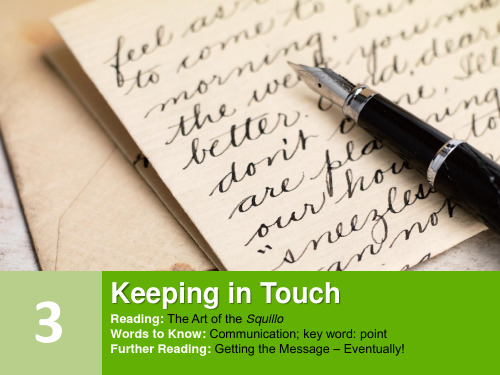
U3-p.25
Reading
Track 6
The Art of the Squillo
A Smartphones have now become such an integral part of daily life that most of us wouldn’t know what to do without them. As well as calls and text messages, these portable electronic devices are now used to surf the net and play video games. However, rarely are smartphones utilized as simply yet effectively as they are for the squillo, a way of communicating that has become standard among young Italians. If you have a cell phone of any description, you have probably received missed calls before. These can be used to give another person your number, which will show up in their caller ID, or as a way of asking someone to give you a call back. However, in Italy, the squillo – which basically means a ring in Italian – is used much more inventively.
- 1、下载文档前请自行甄别文档内容的完整性,平台不提供额外的编辑、内容补充、找答案等附加服务。
- 2、"仅部分预览"的文档,不可在线预览部分如存在完整性等问题,可反馈申请退款(可完整预览的文档不适用该条件!)。
- 3、如文档侵犯您的权益,请联系客服反馈,我们会尽快为您处理(人工客服工作时间:9:00-18:30)。
Break the habit of reading and
reading
• Use the card for breaking rereading habit
• use a card or a folded-up piece of paper above the line of print to block the words after you read them. Draw it down the page slowly and evenly and try to read the passage before you cover the words up. This helps break you of the habit of reading and reading a passage over and over again. It makes you pay more attention the first time. Be sure to push the card down faster than you think you can go. Slide the card down once per page.
Tongue Twister
• 容易型(热身喔) ★The sixth sick sheik‘s sixth sheep’s sick. ★Double bubble gum bubbles double. No double bubble gum doesn‘t bubble double.
较难型(晕眩了) • ★What did you have for breakfast?
• ★粉红凤凰飞, 化肥会挥发
Regression
• Regression is the backward movement of the eyes over information that it has previously considered. It regresses or slows down the pace of reading. The average reader read at rate 250 words per minute and regresses or rereads about 20 times per page. Rereading words and phrases is a habit, which will slow your reading speed down. Usually, it is unnecessary to reread words, for the ideas you want are explained and elaborated more fully in later contexts. Furthermore, the slowest reader usually regresses most frequently. Because he reads slowly, his mind has time to wander and his rereading reflects both his inability to concentrate and his lack of confidence in his comprehension skills.
• Both of these will slow you down to the point in which you find that you can't read any faster than you can speak. Speech is a relatively slow activity; for most, the average speed is about 250 WPM (words per minute).
Unit 3 Body Language Skimming
Contents
Lip-Reading Regression
Eye-Movement Body-Language
Hale Waihona Puke Stop talking to yourself when you
read.
• People talk to themselves in 2 ways, by:
- rubber balls and liquor! What did you have for lunch? - rubber balls and liquor! What did you have for dinner? - rubber balls and liquor! - rubber balls and liquor! ★
• Reading aloud, and subvocalization do have their place in the reading process, but it should be limited and not the norm for one who needs to digest large qualities of material.
• Reading should be an activity which involves only the eyes and the brain. Vocalization ties reading to actual speaking. Try to think of reading as if you were looking at a landscape, a panorama of ideas, rather than looking at the rocks at your feet.
• ★Out in the pasture the nature watcher watches the catcher. While the catcher watches the pitcher who pitches the balls. Whether the temperature's up or whether the temperature's down, the nature watcher, the catcher and the pitcher are always around. The pitcher pitches, the catcher catches and the watcher watches. So whether the temperature's rises or whether the temperature falls the nature watcher just watches the catcher who's watching the pitcher who's watching the balls.★
• vocalizing, which is the actual moving of your lips as you read, and
• subvocalizing, which is talking to yourself in your head as you silently read.
★Peter Piper picked a peck of pickled peppers. A peck of pickled peppers Peter Piper picked. If Peter Piper picked a peck of pickled peppers, Where's the peck of pickled peppers Peter Piper picked?
• 崩溃型(直接晕倒) ★I bought a bit of baking powder and baked a batch of biscuits. I brought a big basket of biscuits back to the bakery and baked a basket of big biscuits. Then I took the big basket of biscuits and the basket of big biscuits and mixed the big biscuits with the basket of biscuits that was next to the big basket and put a bunch of biscuits from the basket into a biscuit mixer and brought the basket of biscuits and the box of mixed biscuits and the biscuit mixer to the bakery and opened a tin of sardines.★
Regression
• John scheduled scheduled an appointment an appointment scheduled an appointment with his advisor with his advisor so that he that he so that he could arrange his program program of courses of courses arrange his program of courses for the coming semester coming semester for the coming semester .
SUBVOCALIZATION
• ---talking while you read, either in your mouth, your throat, and or in your head--or all three at some point. It is not always bad given what and why you are reading, but in most cases, since you already know many of the words and structures you are reading, sub vocalizing is a bad habit that offers you some security for sure that you think you may need, but for the average student who needs to read a lot of stuff, it can be deadly. There is a time and place for sub vocalizing, but it does indeed limit your reading speed to 200-250 words per minute or lower, because that is about as fast as you can talk!
